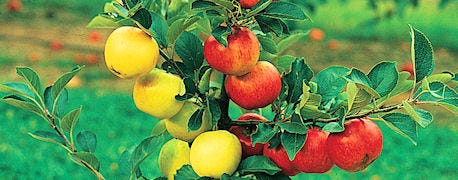
Tomorrow, the National Center for Appropriate Technology will host a free webinar on grafting fruit crops. The focus will be on fruit trees for organic production. But the technology is good for a number of food crops, even tomatoes. If you can't "click in" tomorrow, the webinar can be pulled up from the NCAT archives at your convenience.
Regionally and locally adapted fruit crops aren't just a treat for the palate. Developing them can be a boon to organic fruit growers, and help detail-oriented farmers and nurserymen make boost on-farm income, contends NCAT Horticulture Specialist Guy Ames.

TWO-ON-ONE: Two fruit varieties can, for example, be grafted onto a strong root stock to diversify market offerings.
Ames will present the "Budding and Grafting Fruit Varieties for Organic Production" webinar at Noon Eastern time. He'll get hands-on with a discussion of grafting, budding, cutting and other forms of asexual fruit propagation.
The free-of-charge webinar, will allow plenty of time for participants to ask questions – general or about their own operations. Guy will respond to any questions that aren't answered during the webinar in the days following via email. That's another reason for registering online.
Guy provides farmers, especially fruit growers, with the best information available to empower them to be the most environmentally sound growers they can be while maintaining a sustainable income.
Free pub on organic and low-spray production
Ames has been a professional nursery man and orchardist as well as a technical writer on sustainable fruit production. Recently he and NCAT Specialist Robert Maggiani finished work on a new ATTRA publication, "Plums, Apricots, and Their Crosses: Organic and Low-Spray Production." It focuses on organic and reduced-spray management options for disease and pest problems of plums, apricots, and their crosses (pluots, apriums, etc.).
It also relates progress in broadening the practical climatic adaptability of the apricot. The publication discusses adding these fruits as specialty crops for small-scale, diversified farms and identifies marketing opportunities. This free publication can be downloaded from the www.attra.ncat.org .
About the Author(s)
You May Also Like




